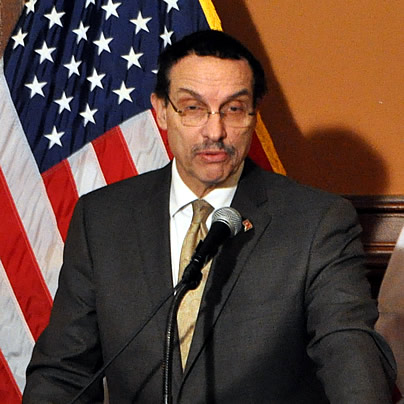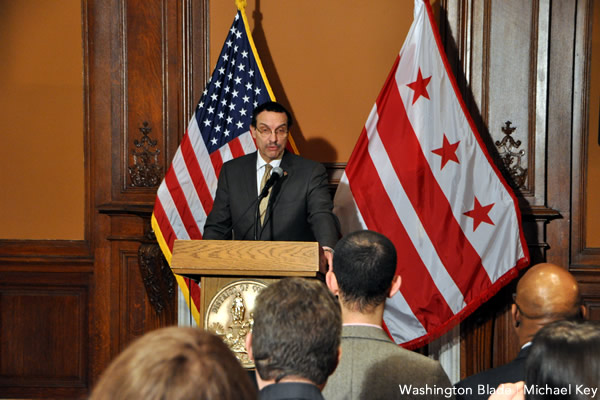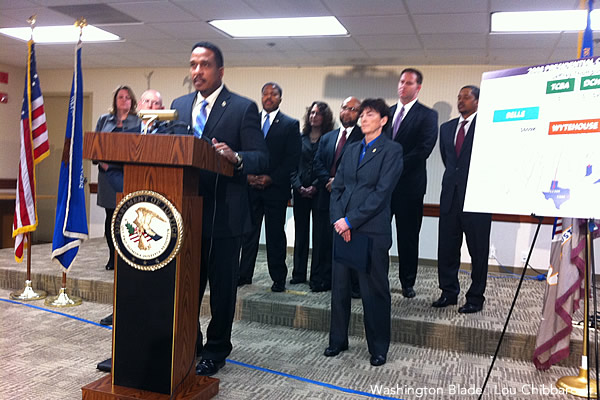Local
LGBT supporters remain loyal to Gray
U.S. Attorney says mayor knew about 2010 ‘shadow’ campaign


Mayor Vincent Gray has not been charged in the case of the so-called ‘shadow campaign.’ (Washington Blade photo by Michael Key)
Similar to their straight counterparts, many LGBT supporters of D.C. Mayor Vincent Gray said their commitment to his re-election has not wavered over allegations by the U.S. Attorney on Monday that Gray knew about an illegal scheme to raise more than $660,000 for his 2010 election campaign.
New details about Gray’s alleged knowledge of a so-called “shadow” campaign surfaced at a hearing in U.S. District Court Monday morning in which businessman Jeffrey E. Thompson pleaded guilty to secretly channeling more than $2 million in illegal contributions to federal and local political campaigns.
In a news conference following the court hearing, Ronald Machen, the U.S. Attorney for the District of Columbia, said someone identified in court documents as “Mayoral Candidate A” was among the recipients of the illegal contributions. Although Machen did not say so directly, it was clear to reporters and court observers that Mayor Vincent Gray was Mayoral Candidate A.
Machen declined to say whether Mayoral Candidate A or other candidates receiving illegal campaign contributions from Thompson were being targeted for prosecution, saying only that the government’s investigation was ongoing.
Gray has not been charged in the case and has repeatedly denied he had any knowledge of illegal actions by Thompson and others associated with the campaign.
“This doesn’t change my level of support for the mayor,” said gay Democratic activist Lane Hudson, who has served as a volunteer fundraiser and coordinator of the Gray campaign’s outreach to the LGBT community. “In fact, it probably increases it.”
Hudson was among the Gray supporters that questioned Machen’s motive behind the government’s decision to file felony campaign violation charges against Thompson and linking Gray to the fundraising scheme less than a month before the city’s April 1 mayoral primary.
Gray told the Washington Post and at least two local TV news stations that Thompson’s accusations that he knew about the illegal campaign scheme were “lies.”
Noting that Thompson made the accusations as part of a deal in which he pleaded guilty on Monday in exchange for a more lenient sentence and a promise to cooperate with prosecutors, Gray said Thompson’s credibility was in doubt.
Thompson, 58, is the former chairman and CEO of a company that had a multi-million dollar city contract to process Medicaid-related services and other health-related services for the D.C. government.
He pleaded guilty on Monday to a federal charge of conspiring to violate federal campaign finance laws and to submit false filings to the IRS. He also pleaded guilty to a D.C. offense of conspiring to violate D.C. campaign finance laws by “defrauding the District of Columbia’s Office of Campaign Finance,” according to a statement released by the U.S. Attorney’s office.
“Jeff Thompson is a man who’s trying to cling to his freedom and offered allegations that have not been substantiated or repeated by anyone else,” Hudson told the Blade. “And until the U.S. Attorney provides evidence to the contrary, Mayor Gray is entitled to the presumption of innocence, especially when his reputation is far more valuable than an admitted felon.”
Gay Democratic activist Peter Rosenstein, another Gray supporter, said he and others in the LGBT community were not condoning illegal campaign practices.
“I believe Thompson should be prosecuted to the full extent of the law as should anyone else found to have knowingly participated in his schemes,” Rosenstein said. “Knowing the mayor and Thompson I am still inclined to believe the mayor. If there is definitive proof the mayor knew what was going on the U.S. Attorney owes it to the citizens of the District to share it now,” he said.
“All I know is that Mayor Gray is a great friend of the LGBT community and denies the allegations,” said Rick Rosendall, president of the Gay and Lesbian Activists Alliance. “Machen’s news conference and charges against Thompson seem suspiciously timed given the upcoming primary election, which is galling given the paternalistic position the U.S. Attorney is in over the District,” he said.
Rosendall was referring to longstanding complaints by D.C. home rule advocates that the city’s prosecutors are federally appointed rather than elected, as is the case with most other cities and states.
Transgender activist Ruby Corado, founder and director of the LGBT community center Casa Ruby, is among many in the city’s transgender community who view Gray’s support for transgender rights as groundbreaking and among the strongest in the nation for an elected official.
“Whatever happens, the only thing I know is I’m supporting the mayor,” Corado said. “I hope everything goes well for him. Nobody is perfect,” she said. “But I know the LGBT community is doing the right thing by standing with him.”
Lateefah Williams, an attorney and former president of the Gertrude Stein Democratic Club, the city’s largest LGBT political organization, was less certain about the impact of the U.S. Attorney’s actions on the LGBT community as a whole.
“I think the news surrounding Jeffrey Thompson’s guilty plea will have an impact on LGBT voters, just as it will have an impact on all other District voters,” Williams said. “Diehard Gray supporters will probably remain loyal, but those who are on the fence or who respect Gray’s accomplishments but have always been uncomfortable with the shadow campaign allegation, will find it much harder to support him,” she said.

U.S. Attorney Ronald Machen speaks at news conference about allegations linking Mayor Gray to ‘shadow’ campaign funds in 2010. (Washington Blade photo by Lou Chibbaro, Jr.)
During the news conference, Machen said the federal investigation into campaign finance law violations in D.C. was continuing and that the information released so far amounted to “the tip of the iceberg.”
In charging documents filed in court, the U.S. Attorney’s office said Thompson’s scheme involved making hidden and illegal campaign contributions totaling $1.3 to seven candidates seeking public office in D.C. between 2006 and 2011.
The documents also say Thompson funneled $608,750 between February and May 2008 for a shadow campaign for a U.S. presidential candidate. Last month, news media outlets reported they learned through sources that the presidential candidate was Hillary Clinton. Clinton has so far not commented on the reports, but people familiar with her 2008 presidential campaign have said she had no knowledge of the alleged shadow campaign.
In addition to the 2010 mayoral campaign, in which Gray was the alleged beneficiary, the charging documents say Thompson funded shadow campaigns for a candidate running in the city’s 2006 mayoral election; the 2007 special election for a Ward 4 Council seat; the 2008 election for an at-large Council seat; the 2010 elections for Ward 1 and Ward 6 Council seats; and the 2011 special election for an at-large Council seat.
Machen declined to name the Council candidates that allegedly received Thompson’s illegal contributions or to say whether they were under investigation for having knowledge of the illegal contributions. However, he said in a number of the cases under investigation, the candidate was unaware that the contributions were illegal and would not be a target for prosecution.
According to the charging documents, Thompson “disbursed approximately $140,000 in excessive and unreported corporate contributions” for a City Council candidate running in 2010 in Ward 1, where gay D.C. Council member Jim Graham was running for re-election. The Washington Post identified the candidate as Jeff Smith, one of two candidates challenging Graham in the Democratic primary.
“I have been seriously victimized by the huge illegal donation to my opponent,” Graham said in a statement released on Monday in referring to Thompson’s donation to Smith. “I want to note also that Jeff Smith failed to file his final month campaign report and his final total campaign report, which was very disturbing to me,” Graham said.
Smith couldn’t immediately be reached for comment.
District of Columbia
Catching up with the asexuals and aromantics of D.C.
Exploring identity and finding community

There was enough commotion in the sky at the Blossom Kite Festival that bees might have been pollinating the Washington Monument. I despaired of quickly finding the Asexuals and Aromantics of the Mid-Atlantic—I couldn’t make out a single asexual flag among the kites up above. I thought to myself that if it had been the Homosexuals of the Mid-Atlantic I would’ve had my gaydar to rely on. Was there even such a thing as ace-dar?
As it turned out, the asexual kite the group had meant to fly was a little too pesky to pilot. “Have you ever used a stunt kite?” Bonnie, the event organizer asked me. “I bought one. It looked really cool. But I can’t make it work.” She sighed. “I can’t get the thing six feet off the ground.” The group hardly seemed to care. There was caramel popcorn and cookies, board games and head massages, a game of charades with more than its fair share of Pokémon. The kites up above might as well have been a coincidental sideshow. Nearly two dozen folks filtered in and out of the picnic throughout the course of the day.
But I counted myself lucky that Bonnie picked me out of the crowd. If there’s such a thing as ace-dar, it eludes asexuals too. The online forum for all matters asexual, AVEN, or the Asexual Visibility and Education Network, is filled with laments: “I don’t think it’s possible.” “Dude, I wish I had an ace-dar.” “If it exists, I don’t have it.” “I think this is just like a broken clock is right twice a day type thing.” What seems to be a more common experience is meeting someone you just click with—only to find out later that they’re asexual. A few of the folks I met described how close childhood friends of theirs likewise came out in adulthood, a phenomenon that will be familiar to many queer people. But it is all the more astounding for asexuals to find each other this way, given that asexual people constitute 1.7% of sexual minorities in America, and so merely .1% of the population at large.
To help other asexuals identify you out in the world, some folks wear a black ring on their middle finger, much as an earring on the right ear used to signify homosexuality in a less welcoming era. The only problem? The swinger community—with its definite non-asexuality—has also adopted the signal. “It’s still a thing,” said Emily Karp. “So some people wear their ace rings just to the ace meet-ups.” Karp has been the primary coordinator for the Asexuals and Aromantics of the Mid-Atlantic (AAMA) since 2021, and a member of the meet-up for a decade. She clicked with the group immediately. After showing up for a Fourth of July potluck in the mid-afternoon, she ended up staying past midnight. “We played Cards against Humanity, which was a very, very fun thing to do. It’s funny in a way that’s different than if we were playing with people that weren’t ace. Some of the cards are implying, like, the person would be motivated by sex in a way that’s absurd, because we know they aren’t.”
Where so many social organizations withered during the pandemic, the AAMA flourished. Today, it boasts almost 2,000 members on meetup.com. Karp hypothesized that all the social isolation gave people copious time to reflect on themselves, and that the ease of meeting up online made it convenient as a way for people to explore their sexual identity and find community. Online events continue to make up about a third of the group’s meet-ups. The format allows people to participate who live farther out from D.C. And it allows people to participate at their preferred level of comfort: while many people participate much as they would at an in-person event, some prefer to watch anonymously, video feed off. Others prefer to participate in the chat box, though not in spoken conversation.
A recent online event was organized for a discussion of Rhaina Cohen’s book, “The Other Significant Others,” published in February. Cohen’s book discusses friendship as an alternative model for “significant others,” apart from the romantic model that is presupposed to be both the center and goal of people’s lives. The AAMA group received the book with enthusiasm. “It literally re-wired my brain,” as one person put it. People discussed the importance of friendship to their lives, and their difficulties in a world that de-prioritized friendship. “I can break up with a friend over text, and we don’t owe each other a conversation,” one said. But there was some disagreement when it came to the book’s discussion of romantic relationships. “It relegates ace relationships to the ‘friend’ or ‘platonic’ category, to the normie-reader,” one person wrote in the chat. “Our whole ace point is that we can have equivalent life relationships to allo people, simply without sex.” (“Allo” is shorthand for allosexual or alloromantic, people who do experience sexual or romantic attraction.)
The folks of the AAMA do not share a consensus on the importance of romantic relationships to their lives. Some asexuals identify as aromantic, some don’t. And some aromantics don’t identify as asexual, either. The “Aromantic” in the title of the group is a relatively recent addition. In 2017, the group underwent a number of big changes. The group was marching for the first time in D.C. Pride, participating in the LGBTQ Creating Change conference, and developing a separate advocacy and activism arm. Moreover, the group had become large enough that discussions were opened up into forming separate chapters for D.C., Central Virginia, and Baltimore. During those discussions, the group leadership realized that aromantic people who also identified as allosexual didn’t really have a space to call their own. “We were thinking it would be good to probably change the name of the Meetup group,” Emily said. “But we were not 100% sure. Because [there were] like 1,000 people in the group, and they’re all aces, and it’s like, ‘Do you really want to add a non-ace person?’” The group leadership decided to err on the side of inclusion. “You know, being less gatekeep-y was better. It gave them a place to go — because there was nowhere else to go.”
The DC LGBT Center now sponsors a support group for both asexuals and aromantics, but it was formed just a short while ago, in 2022. The founder of the group originally sought out the center’s bisexual support group, since they didn’t have any resources for ace folks. “The organizer said, you know what, why don’t we just start an ace/aro group? Like, why don’t we just do it?” He laughed. “I was impressed with the turnout, the first call. It’s almost like we tapped into, like, a dam. You poke a hole in the dam, and the water just rushes out.” The group has a great deal of overlap with the AAMA, but it is often a person’s first point of contact with the asexual and aromantic community in D.C., especially since the group focuses on exploring what it means to be asexual. Someone new shows up at almost every meeting. “And I’m so grateful that I did,” one member said. “I kind of showed up and just trauma dumped, and everyone was really supportive.”
Since the ace and aro community is so small, even within the broader queer community, ace and aro folks often go unrecognized. To the chagrin of many, the White House will write up fact sheets about the LGBTQI+ community, which is odd, given that when the “I” is added to the acronym, the “A” is usually added too. OKCupid has 22 genders and 12 orientations on its dating website, but “aromantic” is not one of them — presumably because aromantic people don’t want anything out of dating. And since asexuality and aromanticism are defined by the absence of things, it can seem to others like ace and aro people are ‘missing something.’ One member of the LGBT center support group had an interesting response. “The space is filled by… whatever else!” they said. “We’re not doing a relationship ‘without that thing.’ We’re doing a full scale relationship — as it makes sense to us.”
CJ Higgins is a postdoctoral fellow with the Alexander Grass Humanities Institute at Johns Hopkins University.
District of Columbia
Bowser budget proposal calls for $5.25 million for 2025 World Pride
AIDS office among agencies facing cuts due to revenue shortfall

D.C. Mayor Muriel Bowser’s proposed fiscal year 2025 budget includes a request for $5.25 million in funding to support the June 2025 World Pride celebration, which D.C. will host, and which is expected to bring three million or more visitors to the city.
The mayor’s proposed budget, which she presented to the D.C. Council for approval earlier this month, also calls for a 7.6 percent increase in funding for the Mayor’s Office of LGBTQ Affairs, which amounts to an increase of $132,000 and would bring the office’s total funding to $1.7 million. The office, among other things, provides grants to local organizations that provide services to the LGBTQ community.
Among the other LGBTQ-related funding requests in the mayor’s proposed budget is a call to continue the annual funding of $600,000 to provide workforce development services for transgender and gender non-conforming city residents “experiencing homelessness and housing instability.” The budget proposal also calls for a separate allocation of $600,000 in new funding to support a new Advanced Technical Center at the Whitman-Walker Health’s Max Robinson Center in Ward 8.
Among the city agencies facing funding cuts under the mayor’s proposed budget is the HIV/AIDS, Hepatitis, Sexually Transmitted Disease, and Tuberculosis Administration, known as HAHSTA, which is an arm of the D.C. Department of Health. LGBTQ and AIDS activists have said HAHSTA plays an important role in the city’s HIV prevention and support services. Observers familiar with the agency have said it recently lost federal funding, which the city would have to decide whether to replace.
“We weren’t able to cover the loss of federal funds for HAHSTA with local funds,” Japer Bowles, director of the Mayor’s Office of LGBTQ Affairs, told the Washington Blade. “But we are working with partners to identify resources to fill those funding gaps,” Bowles said.
The total proposed budget of $21 billion that Bowser submitted to the D.C. Council includes about $500 million in proposed cuts in various city programs that the mayor said was needed to offset a projected $700 million loss in revenue due, among other things, to an end in pandemic era federal funding and commercial office vacancies also brought about by the post pandemic commercial property and office changes.
Bowser’s budget proposal also includes some tax increases limited to sales and business-related taxes, including an additional fee on hotel bookings to offset the expected revenue losses. The mayor said she chose not to propose an increase in income tax or property taxes.
Earlier this year, the D.C. LGBTQ+ Budget Coalition, which consists of several local LGBTQ advocacy organizations, submitted its own fiscal year 2025 budget proposal to both Bowser and the D.C. Council. In a 14-page letter the coalition outlined in detail a wide range of funding proposals, including housing support for LGBTQ youth and LGBTQ seniors; support for LGBTQ youth homeless services; workforce and employment services for transgender and gender non-conforming residents; and harm reduction centers to address the rise in drug overdose deaths.
Another one of the coalition’s proposals is $1.5 million in city funding for the completion of the D.C. Center for the LGBTQ Community’s new building, a former warehouse building in the city’s Shaw neighborhood that is undergoing a build out and renovation to accommodate the LGBTQ Center’s plans to move in later this year. The coalition’s budget proposal also calls for an additional $300,000 in “recurring” city funding for the LGBTQ Center in subsequent years “to support ongoing operational costs and programmatic initiatives.”
Bowles noted that Bowser authorized and approved a $1 million grant for the LGBTQ Center’s new building last year but was unable to provide additional funding requested by the budget coalition for the LGBTQ Center for fiscal year 2025.
“We’re still in this with them,” Bowles said. “We’re still looking and working with them to identify funding.”
The total amount of funding that the LGBTQ+ Budget Coalition listed in its letter to the mayor and Council associated with its requests for specific LGBTQ programs comes to $43.1 million.
Heidi Ellis, who serves as coordinator of the coalition, said the coalition succeeded in getting some of its proposals included in the mayor’s budget but couldn’t immediately provide specific amounts.
“There are a couple of areas I would argue we had wins,” Ellis told the Blade. “We were able to maintain funding across different housing services, specifically around youth services that affect folks like SMYAL and Wanda Alston.” She was referring to the LGBTQ youth services group SMYAL and the LGBTQ organization Wanda Alston Foundation, which provides housing for homeless LGBTQ youth.
“We were also able to secure funding for the transgender, gender non-conforming workforce program,” she said. “We also had funding for migrant services that we’ve been advocating for and some wins on language access,” said Ellis, referring to programs assisting LGBTQ people and others who are immigrants and aren’t fluent in speaking English.
Ellis said that although the coalition’s letter sent to the mayor and Council had funding proposals that totaled $43.1 million, she said the coalition used those numbers as examples for programs and policies that it believes would be highly beneficial to those in the LGBTQ community in need.
“I would say to distill it down to just we ask for $43 million or whatever, that’s not an accurate picture of what we’re asking for,” she said. “We’re asking for major investments around a few areas – housing, healthcare, language access. And for capital investments to make sure the D.C. Center can open,” she said. “It’s not like a narrative about the dollar amounts. It’s more like where we’re trying to go.”
The Blade couldn’t’ immediately determine how much of the coalition’s funding proposals are included in the Bowser budget. The mayor’s press secretary, Daniel Gleick, told the Blade in an email that those funding levels may not have been determined by city agencies.
“As for specific funding levels for programs that may impact the LGBTQ community, such as individual health programs through the Department of Health, it is too soon in the budget process to determine potential adjustments on individual programs run though city agencies,” Gleick said.
But Bowles said several of the programs funded in the mayor’s budget proposal that are not LGBTQ specific will be supportive of LGBTQ programs. Among them, he said, is the budget’s proposal for an increase of $350,000 in funding for senior villages operated by local nonprofit organizations that help support seniors. Asked if that type of program could help LGBTQ seniors, Bowles said, “Absolutely – that’s definitely a vehicle for LGBTQ senior services.”
He said among the programs the increased funding for the mayor’s LGBTQ Affairs office will support is its ongoing cultural competency training for D.C. government employees. He said he and other office staff members conduct the trainings about LGBTQ-related issues at city departments and agencies.
Bowser herself suggested during an April 19 press conference that local businesses, including LGBTQ businesses and organizations, could benefit from a newly launched city “Pop-Up Permit Program” that greatly shortens the time it takes to open a business in vacant storefront buildings in the downtown area.
Bowser and Nina Albert, D.C. Deputy Mayor for Planning and Economic Development, suggested the new expedited city program for approving permits to open shops and small businesses in vacant storefront spaces could come into play next year when D.C. hosts World Pride, one of the word’s largest LGBTQ events.
“While we know that all special events are important, there is an especially big one coming to Washington, D.C. next year,” Bowser said at the press conference. “And to that point, we proposed a $5.25 million investment to support World Pride 2025,” she said, adding, “It’s going to be pretty great. And so, we’re already thinking about how we can include D.C. entrepreneurs, how we’re going to include artists, how we’re going to celebrate across all eight wards of our city as well,” she said.
Among those attending the press conference were officials of D.C.’s Capital Pride Alliance, which will play a lead role in organizing World Pride 2025 events.
Maryland
Health care for Marylanders with HIV is facing huge cuts this summer
Providers poised to lose three-quarters of funding

BY MEREDITH COHN | By the end of June, health care providers in Maryland will lose nearly three-quarters of the funding they use to find and treat thousands of people with HIV.
Advocates and providers say they had been warned there would be less money by the Maryland Department of Health, but were stunned at the size of the drop — from about $17.9 million this fiscal year to $5.3 million the next. The deep cuts are less than three months away.
The rest of this article can be read on the Baltimore Banner’s website.
-

 State Department3 days ago
State Department3 days agoState Department releases annual human rights report
-

 South America1 day ago
South America1 day agoArgentina government dismisses transgender public sector employees
-

 District of Columbia2 days ago
District of Columbia2 days agoCatching up with the asexuals and aromantics of D.C.
-

 Politics4 days ago
Politics4 days agoSmithsonian staff concerned about future of LGBTQ programming amid GOP scrutiny











